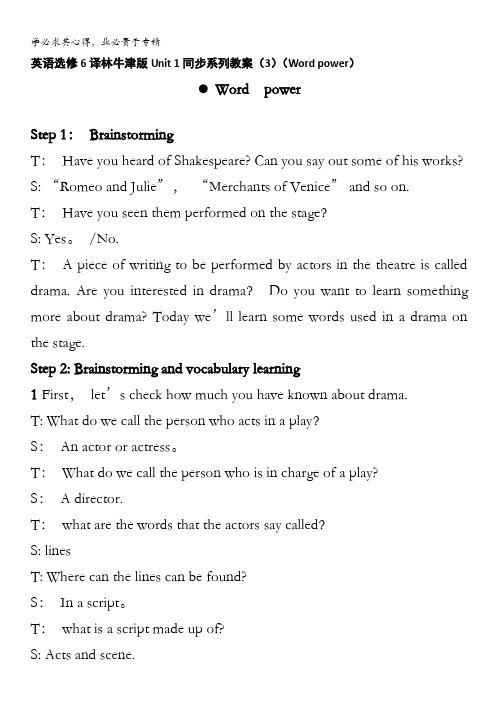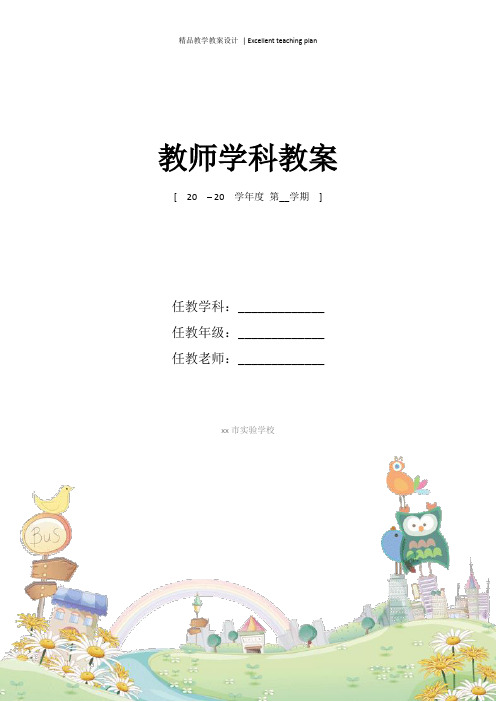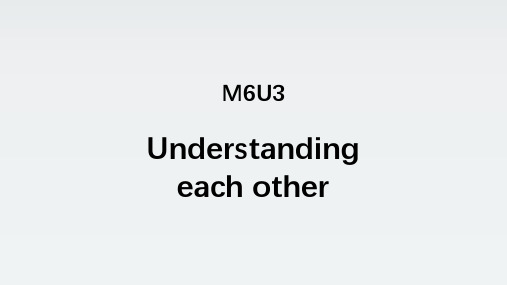Book6U1教案3Wordpower
英语选修Unit 同步系列教案(Word power)

英语选修6译林牛津版Unit 1同步系列教案(3)(Word power)●Word powerStep 1:BrainstormingT:Have you heard of Shakespeare? Can you say out some of his works? S: “Romeo and Julie”,“Merchants of Venice” and so on.T:Have you seen them performed on the stage?S: Yes。
/No.T:A piece of writing to be performed by actors in the theatre is called drama. Are you interested in drama?Do you want to learn something more about drama? Today we’ll learn some words used in a drama on the stage.Step 2: Brainstorming and vocabulary learning1 First,let’s check how much you have known about drama.T: What do we call the person who acts in a play?S:An actor or actress。
T:What do we call the person who is in charge of a play?S:A director.T:what are the words that the actors say called?S: linesT: Where can the lines can be found?S:In a script。
T:what is a script made up of?S: Acts and scene.T: What are the words called that tell the actors how to act?S:They are called stage directions。
Unit 3 wordpower 教学设计新部编版

2.the gymnastics club
3.the Kung Fu club
4.the folk dancing club
5.the skating club
6.the baseball club
7.the golf club
II. Free talk about yourself.
Look at the sports onB)
Step 3 Vocabulary learning
I. Next,look at part A. Zhou Ling is writing her diary. She is thinking of clubs she could join. Now read the passage quickly and underline the names of sports mentioned in the passage.
basketball,volleyball,football,baseball,softball…
Step 5 Discussion
I. Let’s share: Among all the sports,which one do you like best and why?(4 in group)
Ball games:
soccer football/rugby volleyball table-tennis hockey ice hockeybadminton baseball basketball tennis softball golf
golf bowling snooker …
gymnastics:
What kinds of sports does Amy can do to make her strong again?
Book6_U2_教案课时2Wordpower

牛津高中英语教学设计教材:牛津高中英语(模块6)高二上学期文档内容:教学设计—教案单元:Unit 2 What is happiness to you?板块:Word Power作者:赵燕Thoughts on the design:本节课以拓展表达情感方面的词汇为主。
在授课过程中,关注学生的参与度及自主学习方式的培养,并力求设置合理情景,培养学生的实际运用能力。
Teaching aims:After learning this period, the students will be able to:1.learn some useful words on emotions.e the above vocabulary appropriately and freely.3.know something about abstract nouns and idioms in English.Teaching procedures:Step 1 lead in (PPT1-9)1.Share their poems on happiness.2.Ask them to think of more words to express happiness.3.Introduce the concept of abstract nouns.4.Ask the students to tell the adjectives of the nouns.[Explanation]整个导入环节由学生分享他们的小诗开始,可邀请几个学生朗诵作品,并请其他同学评价。
然后围绕快乐这一主题词,以小组为单位要求写出表达快乐的其他词汇(名词);接着分析这些名词的共性-介绍何为抽象名词,并要求他们写出这些名词的形容词形式。
Step 2 More words on emotions (PPT10-13)1.Encourage students to think of more words to express emotions and feelings by using theirown everyday experience.2.Add more words both in noun and adjective forms.Step 3 Activities (PPT14-15)1.Write down the change of Flora’s emotions on p23 of students’ book.2. A guessing game: Work in groups of four to invent a situation to express different emotions orfeelings. Speak in front of the audience and ask them to guess the words. [Explanation]此环节可采取“头脑风暴”鼓励学生说出更多的与情感相关的词汇,并且要求是在情景中描绘,接着扩充更多词汇要求学生记忆。
Unit 1 Section Ⅲ Word power 教学设计新部编版

教师学科教案[ 20 – 20 学年度第__学期]任教学科:_____________任教年级:_____________任教老师:_____________xx市实验学校Unit 1 Section ⅢWord power 教学设计识记掌握自主预习根据首字母提示和英文解释写出下列单词1.f________:happening or existing before,but not now2.g________:to obtain a degree,especially a first degree,from a college or university 3.f________:able to speak a language very well4.d________:to give sth.(especially money) to a person or an organization to help others 5.k________:the quality of being kind6.s________:excellent or very fine7.i________:having their own government8.s________:in some way that you don't know or understand exactly9.r________:happening or starting a short time ago10.i________:officially to tell someone something or give them information about something答案:1.former 2.graduate 3.fluent 4.donate 5.kindness 6.splendid7.independent rm理解拓展名师解析1.former adj.以前的(一)背诵佳句培养语感(教材原句)Former student returns from China以前的学生从中国归来(鲜活例句)George Bush is the former president of the USA.乔治·布什是美国的前任总统。
牛津译林版选修六 Unit3 Word Power 课件

As warm as the sun, as silly as fun
太阳般的温暖,玩笑一样的愚蠢
As cool as a tree, as scary as the sea
大树般冷静,大海般深不可测的恐怖
As hot as fire, cold as ice
火焰般的炙热,冰一般的寒冷
Sweet as sugar and everything nice 甜蜜如砂糖,也如一切美好
墨黑;极黑
2. Without glasses she is as blind as a bat.
视力极差的
3. Be careful of him. He’s as cunning as a fox.
像狐狸一样狡猾
Guess the meanings of the underlined idioms. 4. The beautiful girl is as proud as a peacock.
As sweet as a song, as right as a wrong 如甜蜜的歌,跟错误一样的正义
As long as a road, as ugly as a toad
像路一样长,像癞虾蟆一样丑
As pretty as a picture hanging from a fixture 像挂在墙上的照片般美丽
Idioms 1. as strong as a horse
Idioms 2. as busy as a bee
Idioms 3. as poor as a church mouse
Idioms 4. as cool as a cucumber
Idioms 5. sleep like a log
牛津高中英语模块六wordpower教案

牛津高中英语模块六wordpower教案牛津高中英语模块六word power 教案Step 1: Lead-in (2分钟) Review: What is Ma Jie’s problem? Have you think of some ways to help him? When you give advice ,what guidelines should you remember? What to do and why? [设计说明] 本环节既能复习上一课时的部分内容,同时又很快转入本课时的第一节,即理解skill building 3的内容。
Step 2 Skill building 3 (5分钟)Guidelines What to do Why avoid judging use positive, helpful language do not say, Its wrong for you to people want help but not judgment of their previous behavior. give examples mention a similar situation where your advice works people will know how to use your advice. be specific give the advice that can help people to solve their own problem. people can be helped to solve their problems. [操作说明] 使用多媒体课件分项呈现各表格内容。
Step 3: Writing an article Task 1 (5分钟)Ask students to discuss and list what they should write in the article first. Use the guidelines to find some information (for reference) ·Ma Jies problems ·the possible solutions Ma Jie has thought of and the reasons why they didnt work · the advice you gave to Ma Jie ·the advice his parents, teachers and coach gave him and why it works · your opinion about the best way to solve problems that students have [设计说明] 本环节帮助学生应用前几个步骤所学的内容,为学生的写作构建整体的框架,提供必要的写作要点。
牛津版英语教案 必修六 Unit3 Word Power.doc

Analyzing, researching the origin of a word.
情感态度与价值观
Help students to learn more about different cultures.
教学重点
Help students to know more about different cultures.
Remember the spelling of a word by its pronunciation.
Remember the spelling of a word by analyzing the formation of the word.
Remember the meaning of a word by ma king a sentence with it.
Arabic: orange, sugar.
Italian:motto, piano, opera, studio, umbrella, violin, pizza, spaghetti
课题
Word PowerM6U3 Understanding each other
课型词汇策略Fra bibliotek课型第__周星期___第_____节Nov_,2014
本节(课)三维目标与教学重难点
知识与技能
1. Enlarge students’ vocabulary.
2. Let students know some English words borrowed from other languages and some idioms.
教学难点
Enlarge students’ vocabulary by learning some English words borrowed from other languages and some idioms.
教学设计新部编版+M6U3+word+power

教师学科教案[ 20 – 20 学年度第__学期]任教学科:_____________任教年级:_____________任教老师:_____________xx市实验学校Teaching PlanM6U3 Understanding each otherWord powerEnglish words borrowed from other languagesM6U3 Understanding each otherWord power English words borrowed from other languages Teaching aims:1.Guide students to learn about some borrowed words and idioms in English andtheir meanings, origins, cultural backgrounds.2.Help students to improve the skills of judging, guessing and using borrowedwords and idioms. .3.Motivate students to understand the diversification of culture and raise theirawareness of sharing culture.Teaching procedures:Step 1: Lead in1.Play the English song Jingle Bell and ask——which festival is the song about?2.Let students compare Christmas Day with the Spring Festival (both the new year’sday), point out the cultural difference.3.Ask students: Why are we Chinese celebrating Christmas? ——Culture can beshared, so can language.4.Show students two borrowed words from French and Italian, and direct them toknow about their cultural background briefly.[Explanation]从学生最期盼的圣诞节入题,使学生带着情感和快乐讯速进入课堂情境。
- 1、下载文档前请自行甄别文档内容的完整性,平台不提供额外的编辑、内容补充、找答案等附加服务。
- 2、"仅部分预览"的文档,不可在线预览部分如存在完整性等问题,可反馈申请退款(可完整预览的文档不适用该条件!)。
- 3、如文档侵犯您的权益,请联系客服反馈,我们会尽快为您处理(人工客服工作时间:9:00-18:30)。
牛津高中英语教学设计
教材:牛津高中英语(模块六)高二上学期
文档内容:教学设计—教案
单元:Unit 1 Laughter is good for you
板块:Word power
作者:刘青
Thoughts on the design:
本节课是与本单元主题相关的词汇课,分别涉及到与戏剧相关的分类词汇和与单元主题“Laughter”相关的习语,目的在于拓展学生对与话题相关的词语的认识和运用,而且为本单元的Project教学的展开做好铺垫。
本课将教材的内容略作调整,便于教师操作。
Teaching aims:
After this class, the students will be able to
1.know more about the idioms about smiling and laughing;
2.know more about the vocabulary about drama and performing;
3.know something about what they should take into consideration if they want
put on a drama.
Teaching procedures:
Step 1 lead in (PPT4-8)
1.In the last two periods we have talked about laughter and things which can bring us laughter.
Actually laughter is full of our life. We even have lot of idioms in English about smiling and laughing. (PPT4)
2.Page 7 Part D
Ask the Ss to read to explanations and the example sentences and make sure they have got the meanings of two idioms.(PPT5)
3.Ask the Ss if they know any other idioms about smiling and laughing. If so, ask them to give
examples. If not, give them two more. Give them example sentences first and allow them the chance to guess the meanings. Then give the exact explanations.(PPT6-7)
4.Ask them to find more idioms about smiling and laughter after class.(PPT8)[Explanation]
因为Part D涉及到有关于“smiling”和“laughing”的习语,正好和单元主题相吻合,教师可以顺延前两节课的话题,继续将Laughter,不突兀。
因此将Parts D 提前作为导入,也作为新课的一个环节,起到承上启下的作用。
Step 2 Part A & Part B (PPT 9-12)
1.Many things in our life can bring us laughter and actually we can also do something to
amuse others and ourselves, for example, we can put on performances or a drama. How much do you know about drama and what should you prepare if you want to put on a drama? Now, can you answer these questions? (PPT9-11)
(1)What are all the actors in a play called?
(2)What do we call the person who acts in a play?
(3) What do we call the person who is in charge of a play?
(4) What will an actor read in a script?
(5) What are acts and scenes in a play?
(6) What kind of play is called one-act plays?
See how many questions the Ss can answer, then ask them to read Part A and get all the answers.
Keys: (1) The cast (2) An actor or an actress (3) The director
(4) Lines and stage direction
(5)Acts are like chapters in a book and are made up of different scenes.
Scenes are like paragraphs in a chapter.
(6) Very short plays in which all the action occurs at one time, in one place.
2. Look at Part B and make sure the Ss understand what each word means.(PPT12)[Explanation]
先提出问题,学生有些能回答有些不能,他们的求知欲望会被激发,然后在阅读Part A效果会更好。
Part B结合图画学生能较快的得到各个词汇的具体含义,因此不需要过多的花精力。
Step 3 Part C Application(PPT13)
Ask the Ss to finish Part C using the words mentioned above.
[Explanation]
这一部分根据教材的编排,让学生将所了解的词汇进行运用。
Step 4 Discussion(PPT14)
What should we consider if we want to put on a drama?The Ss may come up with “cast”, “script” and “stage”, remind them that they may have to consider some other things, like “budget”, “costumes” and so on.
[Explanation]
本部分是作为一个总结,考查学生是否真正理解了本课所涉及的词汇,并能进行正确分类。
以讨论的形式给学生提供交流的机会,可以在小组内进行信息交流和相互补充。
此外,这一部分的设计让学生对要筹备戏剧的演出该做哪些准备有一定的思考,为Project的教学做好铺垫。
Step 5 Homework (PPT15)
1. Find more idioms about smiling and laughing;
2. Review all the expressions related to drama and performing.
[Explanation]
家庭作业的布置是课堂的延伸,对课堂教学的内容的巩固。
